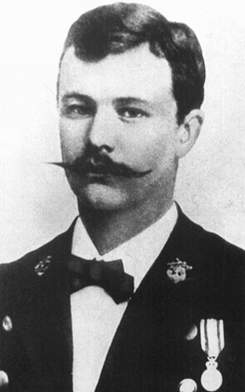Franz Lehár
 The Regiments-Kapellmeister
(bandmaster of infantry regiment number 50, Franz Lehár had two sons. The younger one,
Anton Lehár, inherited his military talents while his older son,
born in the garrison at Komorn on the 30th of April 1870 and
named Franz too, received his fathers musical talents and more!
His parents, recognizing early his talent, sent him to the
Konservatorium at Prague to learn the violin and on completion of his education he
obtained a position as a violinist in the regimental
band of his father at Komorn. In 1890 he himself reached the position of
bandmaster at Losoncz but left the army and
joined the navy. With the k.u.k. Kriegsmarine he was first
Kapellmeister at Pola from 1894 to 1896, followed by service in the garrisons at
Trieste, Budapest (1898) and finally Vienna from 1899 to 1902.
The Regiments-Kapellmeister
(bandmaster of infantry regiment number 50, Franz Lehár had two sons. The younger one,
Anton Lehár, inherited his military talents while his older son,
born in the garrison at Komorn on the 30th of April 1870 and
named Franz too, received his fathers musical talents and more!
His parents, recognizing early his talent, sent him to the
Konservatorium at Prague to learn the violin and on completion of his education he
obtained a position as a violinist in the regimental
band of his father at Komorn. In 1890 he himself reached the position of
bandmaster at Losoncz but left the army and
joined the navy. With the k.u.k. Kriegsmarine he was first
Kapellmeister at Pola from 1894 to 1896, followed by service in the garrisons at
Trieste, Budapest (1898) and finally Vienna from 1899 to 1902.
During his years of military service he composed numerous
songs and operettas, becoming more and more successful. In the
year when the famous "Walzerkönig" Johann Strauß was laid to his rest, Franz Lehár
achieved his first major success at the music theatres in Vienna. Later the music historians fixed
this year as the end of the "Golden era of Operetta"
and the beginning of the so-called "Silver era of Operetta"
- and Franz Lehár became the uncontested imperator of this period. Many
of his songs and operettas - like "Der Graf
von Luxemburg" (The Count of Luxembourg),
"Zigeunerliebe" (Gipsy Love), "Schön ist die
Welt", "Das Land des Lächelns" (The Land of
Smiles), "Paganini", "Der Zarewitsch" (The
Czarevitch) and most of all "Die lustige Witwe" (The
merry widow) - are still unforgotten and performed in music theatres throughout the world
to this day. Franz Lehár
introduced the "dancing-song" in the operetta and was
well known for incorporating Viennese, Slavic and Hungarian elements
into his own music in a unique way. Beside his operettas he
composed numerous waltzes, marches and - in his later years - movie-sound
tracks!
In 1902, when his operettas "Wiener Frauen" and
"Der Rastelbinder" achieved great success at Vienna's
theatres, Franz Lehár decided to leave military service and devote the rest of his
life to the music theatre. He always maintained close friendships with the famous
interpreters of his music like
Alexander Girardi, Richard Tauber and Johannes Heesters and his
brother Anton! The highly decorated officer and the showman
influenced and helped each other during their whole lifetime.
When the famous composer died on the 24th of October 1948 at Bad
Ischl (Upper Austria) his younger brother Anton became the
administrator of his (musical) estate.
Back to Miscellaneous Biographies

 The Regiments-Kapellmeister
(bandmaster of infantry regiment number 50, Franz Lehár had two sons. The younger one,
Anton Lehár, inherited his military talents while his older son,
born in the garrison at Komorn on the 30th of April 1870 and
named Franz too, received his fathers musical talents and more!
His parents, recognizing early his talent, sent him to the
Konservatorium at Prague to learn the violin and on completion of his education he
obtained a position as a violinist in the regimental
band of his father at Komorn. In 1890 he himself reached the position of
bandmaster at Losoncz but left the army and
joined the navy. With the k.u.k. Kriegsmarine he was first
Kapellmeister at Pola from 1894 to 1896, followed by service in the garrisons at
Trieste, Budapest (1898) and finally Vienna from 1899 to 1902.
The Regiments-Kapellmeister
(bandmaster of infantry regiment number 50, Franz Lehár had two sons. The younger one,
Anton Lehár, inherited his military talents while his older son,
born in the garrison at Komorn on the 30th of April 1870 and
named Franz too, received his fathers musical talents and more!
His parents, recognizing early his talent, sent him to the
Konservatorium at Prague to learn the violin and on completion of his education he
obtained a position as a violinist in the regimental
band of his father at Komorn. In 1890 he himself reached the position of
bandmaster at Losoncz but left the army and
joined the navy. With the k.u.k. Kriegsmarine he was first
Kapellmeister at Pola from 1894 to 1896, followed by service in the garrisons at
Trieste, Budapest (1898) and finally Vienna from 1899 to 1902.